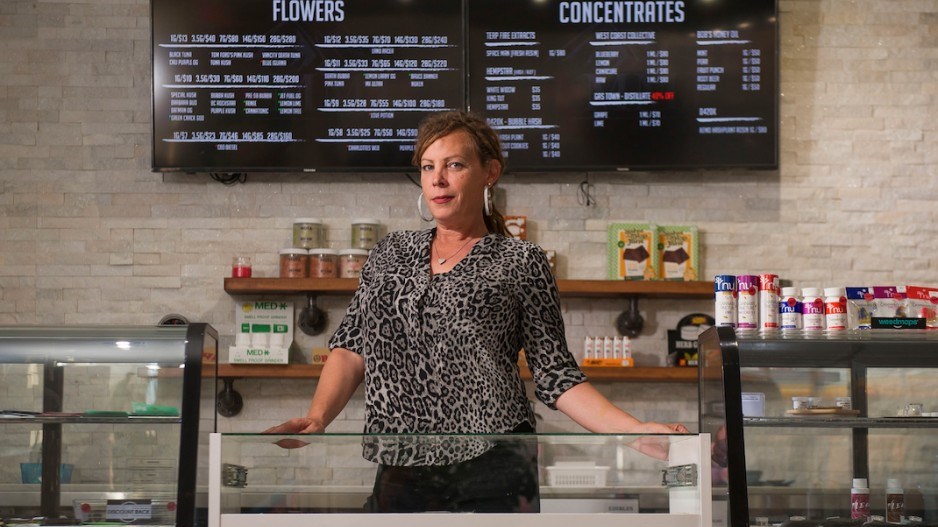Prime Minister Justin Trudeau’s Liberal government has been clear that it wants to legalize recreational cannabis consumption by July, thereby ending 94 years of prohibition in Canada.
The government passed its Bill C-45 Cannabis Act in a 200-82 House of Commons vote on November 27, and the bill is now before the Senate, where some Conservative senators have threatened to delay it long enough that no new law will get royal assent until late 2018.
“I would imagine that we’re on track for sometime in July – at least before August,” said Jamie Shaw, who is director of government relations for the retail cannabis chain MMJ, which has seven dispensaries in Canada, including several that are in various stages of getting licensed in Vancouver.
“We still don’t know what the B.C. government’s plan is as we haven’t seen any proposed regulations yet.”
The B.C. government held a round of consultation before its December 5 announcement that the province will have a hybrid public-private model for retail sales, but Public Safety Minister and Solicitor General Mike Farnworth provided little more clarity than that.
He said the British Columbia Liquor Distribution Branch will wholesale cannabis to public and private resellers and the minimum age to buy cannabis will be 19.
It remains unclear whether the government will establish and run stand-alone cannabis stores or whether it will sell cannabis in government liquor stores.
There is also no word on whether private cannabis sales will be allowed in pharmacies, dispensaries or private liquor stores.
Journalists peppered Farnworth repeatedly about what retail models will be allowed, but he said details would not be revealed until the new year.
See also: Province opts for a hybrid marijuana sales model
News will likely come before February, when the government unveils its 2018 budget. B.C. municipalities will then enact bylaws to regulate how close retail distribution points can be. Municipal lawmakers might even try to stamp out all sales in their communities.
More than a dozen provincial laws must be changed to accommodate legalized recreational cannabis sales, and those changes will likely dominate the provincial legislature’s spring sitting.
Question marks also remain around edibles.
Originally the Cannabis Act outlawed edible cannabis products, but an amendment agreed to during the bill’s committee stage requires that the government enact regulations to allow for the consumption of edible cannabis products within one year from the date that the bill takes effect. So edibles will likely become legal in mid-2019.
Farnworth told Business in Vancouver this summer that he opposes the sale of THC-laced gummy bears because it could lead to overconsumption and be dangerous for children. It is unclear, however, how much clout the province will have in banning sales for specific edible cannabis products.
Federal Health Minister Ginette Petitpas Taylor released proposed regulations in seven broad areas on November 21:
•licensing;
•security clearances;
•cannabis tracking;
•cannabis products;
•packaging and labelling;
•medical marijuana; and
•health.
Canadians have until January 20 to provide feedback on the proposed regulations.
“What I took away from the consultation document is that the federal government is listening to the feedback they’ve gotten,” said Tousaw Law Corp. lawyer Kirk Tousaw, who specializes in cannabis law and represented Cannabis Culture as an intervener at a Supreme Court of Canada hearing earlier this month.
“They’re expanding the product range and making sure that all the stuff that is already available in the illicit market is available relatively quickly in the licit market: edibles, vape pens, concentrates, hashish, topical products, you name it.”
Tousaw also believes that the federal government has heard the calls from aspiring business owners to ease the regulatory regime so that entrepreneurs will be able to easily get licences to produce, process and sell cannabis on a business-to-business level.
Thus far, the process to be licensed as a producer has been complex, confusing and expensive to navigate for most Canadians, he said.
The fact that the government has split proposed requirements to be a cannabis producer into several new categories implies that it intends to have a micro-producer licence, Tousaw said.
“They want the public to give feedback on how to figure out what’s a ‘micro’ versus a ‘standard’ producer.”
Tousaw is convinced that one of the government’s rationales to ask for feedback is to learn how to best reduce the regulatory burden on small producers.
Challenges, however, remain, including whether there will be sufficient product once legalization arrives and whether the system can erode the black market.
“There’s a chronic underestimation of how much cannabis Canadians consume, how much we enjoy cannabis and what kind of demand there is out there,” Tousaw said before suggesting that the current medical marijuana system is so strict that many people who are ill are unable to find a doctor willing to sign a note necessary to legally buy cannabis.
“Most people who use cannabis medically continue to obtain it illegally despite us having a medical system since 2001,” he said. •
Click here to view a digital copy of Business in Vancouver's CannaBiz magazine. To download a FREE PDF of the magazine, click to make the magazine full size and there is a download link in the top left hand corner. Follow CannaBiz magazine on Twitter @CannaBiz_mag




